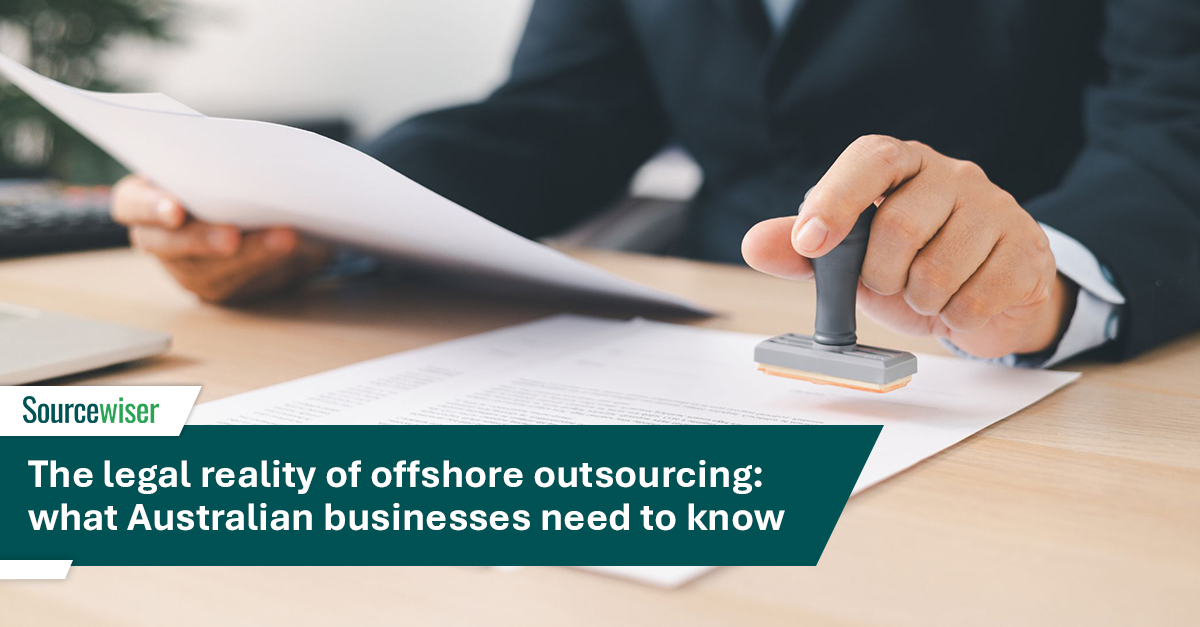Outsourcing has long been a lever for efficiency and scalability, helping Australian businesses streamline operations, reduce costs and access specialised talent. But in today’s regulatory climate, it’s also a test of trust. As outsourcing delivery models mature from transactional staff augmentation to outcome-based partnerships, organisations are placing greater emphasis on governance, transparency and risk management.
This shift is driven by rising regulatory scrutiny and the growing complexity of data protection obligations. The OAIC Notifiable Data Breaches Report 2024 revealed a 19% year-on-year increase in reported breaches, with 71% caused by malicious or criminal attacks. These figures underscore the urgency for businesses to reassess how data is handled across their extended workforce, including offshore vendors, digital workers and subcontractors.
Outsourcing has long been embedded in core business functions like finance, HR and customer service - but as digital transformation accelerates, the complexity of managing those functions has increased. Sensitive data now moves seamlessly across borders, platforms and third-party ecosystems. Without robust compliance frameworks, businesses risk not only financial penalties but also reputational damage and operational disruption.
For Australian organisations outsourcing critical processes, whether locally or to offshore hubs like the Philippines, compliance is no longer a checkbox. It’s a cornerstone of resilience, reputation and operational integrity. The challenge is not just about outsourcing efficiently but outsourcing securely and responsibly.
The compliance landscape for Australian businesses
Australia’s data privacy framework is anchored in the Privacy Act 1988 (Cth) and the Australian Privacy Principles (APPs). These govern how personal information is collected, stored and disclosed, with strict rules around cross-border data transfers.
The 2024 Privacy Act review proposes tighter controls including mandatory risk assessments for overseas disclosures and stronger enforcement powers for the OAIC. This means outsourcing providers, whether local or offshore, must demonstrate compliance not only with Australian laws but also with international standards like ISO 27001 and GDPR equivalence.
A recent PwC Digital Trust Insights report found that 47% of Australian organisations believe compliance complexity has grown significantly in the past two years. As regulatory expectations rise, outsourcing partners are expected to go beyond operational delivery and take on a more strategic role in safeguarding data. They must be equipped to manage privacy risks, maintain audit readiness and uphold governance standards across borders.
Why data security is a top outsourcing priority
As outsourcing arrangements become more complex, data security has emerged as a critical factor in vendor selection. The risks are real and rising. According to the Deloitte Global Outsourcing Survey, 60% of organisations report increased exposure to security threats during outsourcing transitions. This trend is especially pronounced in Australia, where the average cost of a data breach has climbed to $4.03 million per incident (IBM Cost of a Data Breach Report 2024).
Several factors contribute to this heightened risk:
- Third-party access to sensitive customer or financial data
- Inconsistent data handling practices or lack of encryption
- Limited visibility into vendor operations and security controls
These vulnerabilities can lead to regulatory breaches, reputational damage and operational disruption. For Australian businesses, especially those operating in regulated sectors like healthcare or finance, the consequences of non-compliance are severe.
However, these risks are not insurmountable. In fact, they present an opportunity to build stronger, more resilient outsourcing partnerships. The most effective providers don’t just comply with security standards, they embed protection into the DNA of their service. This proactive approach transforms security from a reactive cost centre into a strategic advantage.
By engaging outsourcing partners that prioritise compliance and invest in robust security infrastructure, Australian businesses can strengthen their overall risk posture and embed resilience into their operations. These providers go beyond baseline requirements, building security into every layer of delivery, from architecture to execution.
This commitment is reflected in the safeguards built into Sourcewiser’s delivery framework - designed to protect client data, strengthen governance and ensure operational continuity at scale. These include:
- Comprehensive security governance, underpinned by rigorous internal controls, privacy frameworks and continuous audit readiness
- Role-based access controls and encryption protocols that protect information across systems, devices and geographies
- Continuous monitoring and real-time threat detection, powered by automated alerts, analytics and 24/7 oversight
- Defined incident response and escalation frameworks that ensure accountability, transparency and rapid recovery when issues arise
By embedding these protections into its delivery framework, Sourcewiser ensures that security is not an afterthought but a foundation. This approach enables organisations to scale confidently - maintaining control over their data, meeting regulatory obligations and strengthening customer trust without compromising on agility or performance.
Learn more about Sourcewiser’s security and compliance standards and how they underpin every client partnership.
Compliance essentials in outsourcing partnerships
For Australian organisations, selecting the right outsourcing partner is not just a procurement decision, it’s a governance imperative. As regulatory expectations intensify, businesses must ensure that their partners are not only operationally capable but also fully aligned with compliance, data protection and risk management standards.
To build a secure and compliant outsourcing relationship, businesses should look beyond surface-level credentials and assess how deeply compliance is embedded in a provider’s operations. This means evaluating not just what policies exist, but how they’re implemented, monitored and enforced across the service lifecycle. The following areas offer a practical framework for assessing whether an outsourcing partner is equipped to meet Australian regulatory and privacy obligations:
- Governance and transparency
Providers should offer structured reporting, audit-ready documentation and clear visibility into how services are delivered. This matters because transparency fosters accountability and enables proactive oversight.
- Data protection and certification
A provider’s ability to protect sensitive information is central to maintaining trust and meeting legal obligations. Compliance with the Australian Privacy Principles and certification to international standards like ISO 27001 demonstrate that a provider has mature, well-documented controls in place. These frameworks ensure that data is handled securely across systems and jurisdictions, and that privacy risks are actively managed, not just acknowledged.
- Data residency and sovereignty
Understanding where data is stored, processed and accessed is critical for complying with cross-border transfer rules. Offshore providers must offer clarity on data localisation and demonstrate alignment with Australian privacy laws to avoid regulatory exposure and ensure control over information assets.
- Incident management and response
A provider’s ability to respond to breaches or disruptions can determine how quickly a business recovers and how well it meets its notification obligations. Predefined escalation paths, tested recovery plans and clear breach protocols are vital for maintaining continuity and regulatory compliance.
- Employee training and access controls
Trained employees are essential to maintaining a secure and compliant outsourcing environment. When offshore teams understand and apply privacy protocols aligned with Australian standards, they actively contribute to protecting sensitive data. Role-based access ensures that information is only available to those with a legitimate need, while regular audits and clear segregation of duties reinforce operational discipline. These measures work together to support regulatory compliance and build a culture of accountability across the partnership.
- Vendor and subcontractor oversight
An outsourcing partner’s supply chain can introduce hidden risks if not properly managed. Businesses must confirm that any subcontractors meet the same compliance standards, with contractual safeguards and active oversight to maintain integrity across all service layers.
Embedding these six compliance pillars strengthens governance and reduces risk but sustaining them at scale requires more than manual oversight. As outsourcing grows more complex, technology and automation are becoming essential tools for maintaining secure, compliant operations.
The role of technology and automation in compliance
As outsourcing evolves into a strategic function, technology is now central to managing compliance. With rising regulatory demands and complex data environments, AI and automation have become essential. These tools support real-time monitoring, enhance data protection and simplify audit readiness, keeping operations secure, scalable and compliant.
Artificial intelligence enhances compliance by detecting anomalies in real time. It continuously monitors data access, usage patterns and system behavior to flag irregularities before they escalate, enabling a more proactive approach to risk management.
Meanwhile, secure cloud infrastructure, reinforced by role-based access controls and encryption, protects sensitive data across geographies. These safeguards are especially critical in cross-border outsourcing, where data sovereignty and localisation requirements must be met without compromising accessibility.
Automation also accelerates compliance reporting. By digitising documentation and standardising workflows, organisations can respond to audits faster and more accurately. In the Gartner Report, automation can cut compliance effort by 35% and improve incident response time by 45%, boosting both efficiency and confidence in meeting evolving standards.
Case example: building secure, compliant offshore operations
To scale operations and strengthen compliance, an Australian healthcare provider restructured its accounts payable function through a managed services model. The shift addressed fragmented processes and limited visibility, laying the foundation for a more secure and efficient finance operation.
The transformation began with digitising invoice intake and rationalising vendor master data, eliminating duplication and streamlining workflows. Routine AP tasks were transitioned to a dedicated offshore team, supported by automated workflows and a centralised digital knowledge base.
The impact was clear: over $450K in annual savings, improved audit readiness through digitised records, and real-time visibility into vendor transactions. Freed-up resources were redirected to frontline care, while governance protocols ensured consistent oversight across locations.
This example shows how strategic outsourcing, when paired with secure processes and the right technology, can deliver both operational efficiency and compliance integrity. By embedding control and visibility into the operating model, the healthcare provider turned a fragmented cost centre into a scalable, future-ready finance function.
Compliance and data security are not barriers to outsourcing, they’re enablers of sustainable growth. With the right partner, Australian organisations can maintain control, meet regulatory obligations and operate securely while scaling globally.
Whether outsourcing locally or offshore, businesses must embed compliance into the foundation, not bolt it on as an afterthought. In today’s risk landscape, secure outsourcing is not just smart, it’s essential.
Ready to dive deeper? Explore our guide: Outsourcing to the Philippines in 2025: your quick start guide to discover how robust outsourcing partnerships deliver resilience, compliance and growth.



